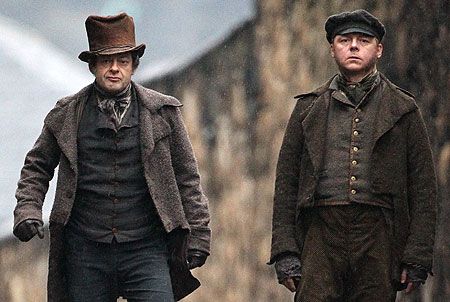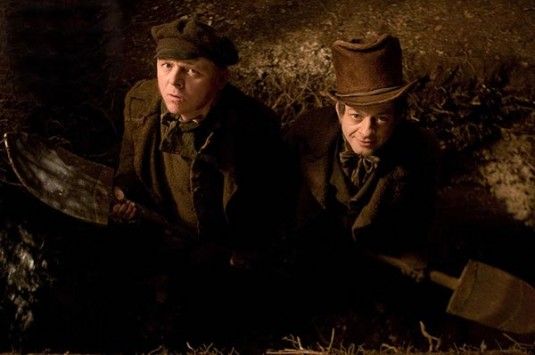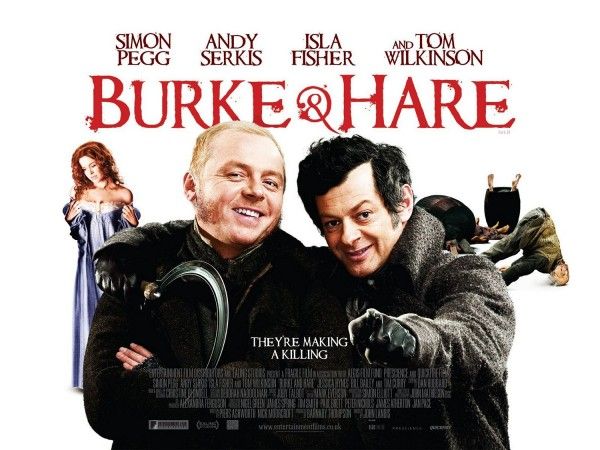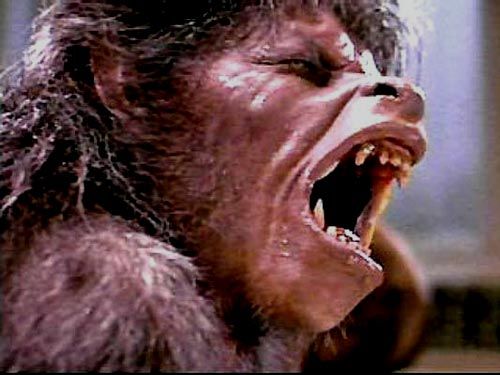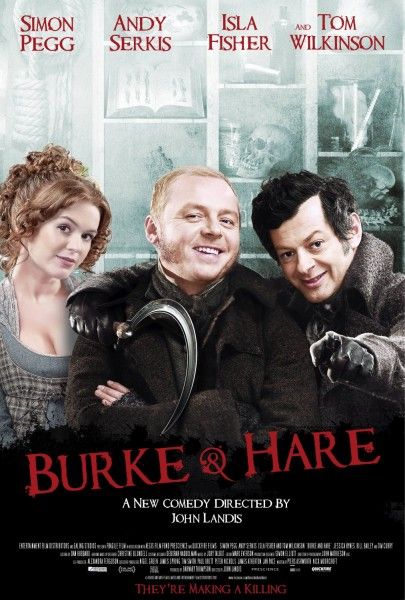The black comedy Burke & Hare (currently available on VOD through SundanceNow and out in theaters on September 9th), from director John Landis, is about two 19th century grave robbers who find a lucrative business providing cadavers for an Edinburgh medical school. Selling dead bodies to medical schools became big business in the 1800s, and William Burke (Simon Pegg) and William Hare (Andy Serkis) saw an opportunity to make their fortunes. The only problem was that there weren’t any dead bodies to be found, so to meet the demand, the two men began to arrange a series of deadly “accidents,” securing a steady stream of bodies and the cash for them, but also drawing more attention than the pair would ever want.
During a recent exclusive phone interview with Collider, Landis (Animal House, Trading Places) talked about the serendipity that led to him directing Burke & Hare, making serial killers likeable leads for a romantic comedy, and making Simon Pegg and Andy Serkis an evil Laurel & Hardy, his direct approach with actors. He also talked about his thoughts on remakes, the possibility of someone doing their own take on An American Werewolf in London, doing a film adaptation of the farcical play The Rivals for his next project, and what led him to direct some episodes of the TV series Psych. Check out what he had to say after the jump:
Question: How did you get involved as the director of Burke & Hare?
JOHN LANDIS: It was just serendipitous. I was in London visiting a director who is a friend of mine, named Gurinder Chadha. She’s a Brit who is an Anglo-Indian filmmaker, and her most famous movie is Bend it Like Beckham. We’ve known each other for a long time, and she invited me to lunch at her office, which was at Ealing Studios. Of all the studios in the UK, Ealing was literally the only one I’d never worked at or visited, and I had tremendous curiosity to see it. It’s the only studio that’s actually in London. All the others are outside of town. It has a wonderful history with Sir Michael Balcon and all the great films they’ve made, and I wanted to see it.
So, I went out and had lunch with Gurinder and, while we were having lunch, a man walked by and she introduced me to Barnaby Thompson, who is a guy that bought the studios with a group, 10 or 15 years ago, as a real estate thing. That group has revived Ealing and are making movies. She introduced me to him and he said, “John Landis? Are you the director?” And I said, “Yes.” And he said, “Oh, I have a script. Would you read it?” So, he gave me the script and I was very taken with how perverted the notion is.
Burke & Hare is a romantic comedy, and making a romantic comedy out of such completely inappropriate material attracted me. I just thought it was really funny and subversive. It was like someone coming up and going, “I’d like to make a romantic comedy about Charles Manson.” That’s so wrong! So, I was taken with that notion and I quite liked the script. There have been a number of films based on Burke and Hare, all of them horror films. The best was probably The Body Snatcher, the Robert Wise film for Boris Karloff. But, the irony is that ours is, by far, the most accurate historically. You’re on their side, but there’s no apologies made for what they’re doing. That’s the challenge.
How difficult was it to make Burke and Hare likeable individuals?
LANDIS: That’s exactly why I took the job. That’s one of the reasons I went after Simon Pegg. I really think that Simon has this fabulous sympathy on screen. You really, really like him, in almost everything he does, and I thought that was good. Simon is a much better actor than even he knows. For one thing, the movie is an accent movie. There are three characters with Irish accents, one with an English accent, and everyone else is Scottish. Trying to cast it was a challenge because I wanted to get two guys who you will like, despite the fact that they are doing dreadful things.
Was it your intention to find a modern-day, somewhat twisted Laurel & Hardy?
LANDIS: What I told Andy [Serkis] and Simon [Pegg] was that my idea was to do the evil Laurel & Hardy. I adore Laurel & Hardy. Stan and Oli are always childish, but they’re also cast, very often, as bad guys. They’re doing something bad, but you like them so much that you really care about what happens to them. That was definitely something I did discuss with them. They’re great actors.
A lot of the actors that work with you say that they appreciate your directness and how rapidly you get things done. Is that how you’ve always directed, or is that something that’s developed with experience?
LANDIS: I worked on a lot of movies before I was a director. I’ve literally done everything you could do on a movie, except hair, so I enjoy the craft. I enjoy the whole process of pre-production, production and post-production. I like it all. I am very direct and I tend to treat everyone exactly the same, which sometimes gets me in trouble because some movie stars feel like they should be treated differently. But, when you’re dealing with good actors, they really appreciate it. Truthfully, most directors don’t direct actors. Ask the actors you interview how many directors actually direct them. Every actor is different, so when you’re asked, “How do you approach an actor?,” it depends on the actor. With some, you do nothing. With some, you’re very specific. And then, everybody’s method is different. Some people just have a real nuts and bolts craft approach, and it’s quite straightforward. Other people need a method way of getting to the character. You have to work with everybody’s own meshugas and just get the piece you need for the film.
What were you able to do with this film that you haven’t felt you’ve been able to do with studio films in America?
LANDIS: Well, I’ve actually been pretty lucky in the studio films I’ve made. With the vast majority of them, I was able to do the best I could and was allowed to do it. Blues Brothers 2000 was the first time I ever had a movie really fucked with. That was a very discouraging thing. They hurt the movie. But, I always had very good experiences at the studios.
You’ve had great success with infusing humor into these twisted, grisly subjects. When did you first become attracted to that type of story? Was that something that always appealed to you?
LANDIS: It’s funny because I’m part of this group, The Masters of Horror, but I’ve only made two horror films. The majority of my films are comedies and musicals, like Trading Places, Animal House, The Blues Brothers and Three Amigos. I’m actually a big fan of the genre pictures. I love fantasy films. I just like films. I’m a movie buff. I really enjoy the movies. I love Westerns. Walter Hill once said to me, “If they knew how much fun it was to make a Western, they wouldn’t let us.” I’ve worked on many Westerns – mostly in Spain, but some in this country and in Mexico – but never as a director. The only one I’ve directed was Three Amigos, and that was a comedy. I also love musicals.
Where did your love and passion for movies and old Hollywood come from? As this business changes, is it difficult for you to stay so passionate about it?
LANDIS: Movies are brand new. Film is less than 150 years old. It’s brand new, compared to any other art form, all of which are thousands of years old. Because of the cumbersome nature of filmmaking, it’s only recently that it has become available to the masses, with digital equipment and laptop computers. You can now actually make a pretty serviceable movie for very little money by yourself. Up until now, the vast majority of films produced were produced by what is called the motion picture industry, or the movie business. Art and commerce, in this business, have always been very much a part of it.
With all the films that you’ve done, are there any that you’d be curious about seeing another filmmaker do a remake of, and are there any that you would never want touched?
LANDIS: The idea of remakes and sequels, in and of themselves, does not offend me. It’s a standard practice. People forget that The Wizard of Oz is a remake and The Maltese Falcon is a remake. I don’t have anything against remakes. The Howard Hawks film The Thing is a great film, and so is John Carpenter’s. David Cronenberg’s The Fly is a great film. But, the original The Texas Chainsaw Massacre is really a masterpiece while the remake is like a shampoo commercial. That’s disappointing.
Dimension optioned the rights to remake An American Werewolf in London from me, two years ago, but I don’t know what they’re doing with it. When I did that, everyone was angry with me, so I said, “Look, if someone can come up with a new or interesting angle, or way to do it, he or she might make a wonderful movie.” If they do and it’s successful, then I make even more money, and I’d be delighted. If someone does a shitty job, then I look brilliant. It’s a no-lose proposition for me. Whenever people say, “How could you let them make such a shitty movie out of your book?,” to Stephen King, he always says, “Look, you can get my book. It’s right there on the shelf. Nothing has hurt the book. Go get it.” If there’s a bad remake of a movie, you can always see the original movie. How many times can you do a Shakespeare play? Well, the answer clearly is hundreds of thousands.
What’s unfortunate now is the reason they’re doing remakes and sequels and franchises, and it’s because of marketing. They have to sell pre-sold titles. The business is in a state of flux. It’s very weird. I’ve made so many movies that made more money their second and third weekend than their first because you used to open in a theater and they allowed you to build word-of-mouth. Now, it’s completely different. Movies open in thousands of theaters, and if you don’t perform in your first three days, then you have no chance to find an audience and you’re pulled. Things have evolved, and I don’t know what’s going to happen.
What are you going to be working on next?
LANDIS: I’m doing a film in London that’s very different from Burke & Hare, and actually pretty different from anything I’ve done. I’m doing a film of the play by [Richard] Sheridan, called The Rivals, with an incredible cast. I’m very excited. It’s radically different from anything I’ve done. It’s a farce that takes place in 1775, in London and Bath.
Is the fact that it is so different what attracted you to it?
LANDIS: Sure, of course. Absolutely! You always want to do something different. I enjoy the process. I like making movies, and it’s increasingly hard to find a movie you’d want to make. I was very, very lucky, in that I got to make a lot of fairly radical pictures that were successful. If they hadn’t been successful, then I would have been screwed. The irony of all this is that people forget that the films of mine that they now called classic films and that they hold up as role models were completely trashed by the critics, at the time. They were shit on. Go read reviews of The Blues Brothers, or even Animal House. I think Trading Places was the only movie I made that got sort of good reviews, in this country. Very often, the same critics who shit on you, refer to you as a classic filmmaker and these films as classics, 20 or 30 years later, and you go, “Well, where the fuck were you then? What happened?”
Anytime something makes money, no matter how outré, it’s instantly mainstream. A good example is rock ‘n’ roll. When rock ‘n’ roll was first played to a wide audience it was considered the devil’s music. People had record burnings, and started Congressional hearings about Communism and juvenile delinquency. And, what happened was that rock ‘n’ roll started to make so much money and generated so much income for the record companies that suddenly it was no longer evil. It’s like rap music. They sought out rap music to attack, but you don’t hear that anymore because it made too much money. They use Che Guevara to sell soft drinks. If something comes out that is radical and it’s successful, then it’s no longer radical. It’s co-opted.
People talk about the successors of Animal House, but what they don’t talk about is that, if you look at movies like The Hangover and Bridesmaids, they’re completely conservative pictures that are happy. Or, look at Knocked Up or Juno. What do those movies tell you? “Have unprotected sex and everything will be fine.” It’s insane! I was very lucky to come along at a time when the studios let the filmmakers make movies that reflected reality. Animal House takes place in 1962 and ends in civil insurrection. I’m not sure a studio would ever let me do that now. Fast Times at Ridgemont High is a great high school movie, but a character in that gets knocked up and has an abortion. It’s a different time now. It’s a creepy time, as reflected by our insane politicians. It’s terrifying.
What do you enjoy about directing television, and how did you come to direct episodes of Psych?
LANDIS: That was a total fluke. I got a call, out of the blue, asking me to do it. When you direct a show for cable, it’s not very good money. It’s the identical job as directing an hour for network, but the money is three or four times less, for the same amount of time, because it’s cable.
The first thing I ever did for television was, as a favor for Steve Martin, I directed an episode of a show he was the executive producer of, called George Burns’ Comedy Week. They were anthology comedy shows that lasted one season, and the directors were me, Mel Brooks, Carl Reiner, and really good directors, and they were funny. The one I did had a great cast. It was Don Knotts, Don Rickles, George Burns, Fannie Flagg and Stephen Collins. It was very funny. I went in the day after it aired on NBC and said, “How’d we do?,” and they said, “About 20 million people watched it.” I said, “That’s great!,” and they said, “No, that’s a failure.” Now, 20 million people is a big audience. Things change, all the time.
But, the bottom line is that the way I ended up doing Psych was that James Roday and (show creator) Steve Franks are real film buffs and they’re always getting amazing people on that show by just calling them up and saying, “Come and do the show.” I enjoyed it. I’ve directed three of them so far. It was really fun! It’s a very nice group of people and I like them very much. I would do another, if I had the opportunity, but unfortunately, or fortunately, I’ve been working.

